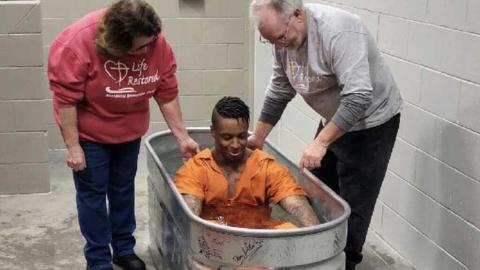
Reflecting the Heart of the Father: The Church Must Better Embrace People Living with Disabilities
ANALYSIS
Christine sat on the blob, a floating trampoline on the lake, waiting for me to jump from the tower that warm, summer day at Young Life camp. I was a senior in high school and hadn't had much interaction with Christine before this moment. She clearly had an intellectual disability and spent a lot of time alone. As I waited for my signal to jump — a move that would send Christine flying and splashing into the water — I had a stark realization. This feat on Christine's part was exceedingly brave, but no other teenagers were lining the lakefront beach to witness this courageous act.
Suddenly, as if on cue, our Young Life leader rallied what seemed like hundreds of teenagers who came running. Cheering for Christine, the beach exploded with shouts of praise and encouragement.
Closing my eyes, I jumped, and Christine was launched into the water — into the outstretched arms of dozens of counselors and kids waiting to embrace her.
Swimming in the lake, I reflected on the scene I had just taken part in. At this moment, we had switched places: I was alone in the water while Christine ran up and down the beach surrounded by a community of friends. It was the first time I realized that people living with disabilities are often isolated and alone. While I had spent my week at camp reveling in the company of dozens by my side, Christine had mostly kept to herself. It wasn't that people didn't like Christine. It was just that people didn't think about her — at least I hadn't.
I think we became the body of Christ at camp that day; Christine's willingness to invite us into her adventurous experience led to our actions, prompting many friendships with her. Together, we reflected the heart of Jesus. And it's an invitation that's open to all believers — everywhere. As the Church it's our job to notice everyone — to celebrate differences, walk alongside and receive with open arms people living with disabilities through the gift of friendship.
That experience in high school so many years ago has stuck with me. As I paddled in the water alone that day, my eyes were opened to people with disabilities. That day was a gamechanger for Christine, too. All of a sudden, Christine was seen at school. Kids were quick to high-five her and congratulate her on her accomplishment. The girl that no one noticed suddenly had friends and I got to be one of them.
Disability is everywhere, and it's affecting more and more individuals and families across the globe. Each year, about 6,000 babies are born with Down syndrome in the U.S., making it the most common birth defect in the country. Moreover, The Center for Disease Control reports that approximately 1 in 36 children in the United States are now diagnosed with autism spectrum disorder (ASD), according to 2020 data.
The Church is poised in a unique capacity to offer lifelong ministry to people with disabilities and their families. And that's what families are looking for. They need the Church to walk alongside them from birth to end-of-life care as they support a loved one with disabilities. And they especially need the Church to move from a heart of pity or just "being nice" to a place of need and value. This happens when the church begins to see how much they need people with disabilities; it isn't a one-sided need or relationship.
It's a mutual discipleship. That is, individuals with disabilities and their families need the Church, yes — but the Church needs them as well. People with disabilities offer so much to the Church and to the community if we just have eyes to see.
I have a sweet friend named Kate. Kate has an intellectual disability and makes jewelry for a nonprofit company to support women. One afternoon, Kate, who had been participating in a Young Life leadership program for people with disabilities, was overwhelmed with her jewelry-making workload; that's when she remembered a principle from her leadership program. "Ecclesiastes 4:9 reminds us that two are better than one," Kate later told me. "I knew I couldn't get my work done alone that day, so I said to my co-workers, 'Ladies, I'm overwhelmed, but I know that two people are better than one. Will you help me?'"
Of course, the other women flocked to Kate, helped her complete her work and then the group worked in pairs to get everyone's product finished that day.
This story reminds me that we need one another. We each have something to offer in relationships. Likewise, the Church is called to support and be in relationship with people who have disabilities, just as those people with disabilities are called to offer their gifts and talents as a committed member of the Church.
Let's endeavor to come together as believers to support those who have disabilities. Let's walk alongside their families in lifelong relationship. And, let's move from doing so out of a place of "just being nice" to a place where we realize we need these individuals and their families walking beside us in relationship, too.
We best reflect the heart of the Father when everyone has a place in the pew.
Suzanne Williams is the vice president of Young Life Capernaum and is based in Nashville, TN.



